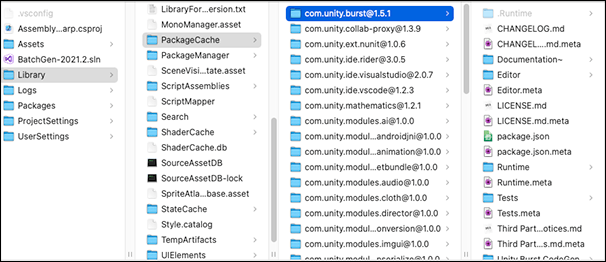嵌入式依赖项
项目的 Packages 文件夹下出现的所有包都是嵌入在该项目中的。您可以通过多种方式嵌入包:
- 直接在您项目的
Packages文件夹中创建一个新包。 -
Manually copy a Unity package from the project’s package cache into your project’s
Packagesfolder. - 使用 C# 脚本嵌入已安装的包版本。
嵌入式包无需在项目清单中显示为依赖项;但是,如果嵌入了某个版本的已安装包,则项目清单仍会列出对原始已安装版本的依赖项。在这种情况下,磁盘上的包优先于列为依赖项的包版本,因此不需要从项目清单中删除它。例如,如果项目清单指定了对 com.unity.example 版本 1.3.1 的依赖项,但是项目还具有该名称的嵌入式包,则 Package Manager 将使用嵌入式包(无论是否是其明显版本),而不是从注册表下载版本 1.3.1。
确保您跟踪嵌入式包的内容以及对其所做的任何更改。如果您的 Unity 项目在源代码控制下,则还应将该项目中嵌入的任何包添加到同一源代码控制下。
创建新的自定义包
要嵌入新包,请在 Packages 文件夹下的一个文件夹中创建新包内容。有关更多信息,请按照创建自定义包的说明。
通常,您的新包会一直嵌入到您的项目中,直到您准备与其他用户共享以及在其他项目中对其进行测试。然后您可以将它发布到范围包注册表。
从缓存中复制 Unity 包
在缓存中找到包文件夹的最可靠方法是直接在 Unity 编辑器中找到已安装的版本:
Open the Project window by opening the Window menu and selecting General > Project.
From the Project window, find the installed package you want to embed.
-
Right-click the folder of the selected package and select Show in Explorer (Windows) or Reveal in Finder (macOS). That package’s folder opens directly in a file browser and uses the
<package-name>@<package-version>naming convention.Note: If the package you want to embed isn’t in your project, you can get it directly from your project’s package cache (
<project>/Library/PackageCache) by using your file browser or command line and navigating to the correct folder. However, it’s more reliable to let the Editor find it for you, because in addition to locating packages in the project cache, it also locates packages that are installed from a local folder or tarball, and packages that are already embedded.
文件浏览器打开到项目的包缓存下的包文件夹 Copy the package folder and paste it directly into your project’s
Packagesfolder. Don’t put it inside theAssetsfolder, because the Package Manager does not scan that folder for packages.Remove the
@<package-version>portion of the folder name.Add the newly embedded package to source control if your project is already under source control.
注意:您也可以在全局缓存下找到包文件夹,但全局缓存包含 Unity 编辑器在系统上曾安装过的所有版本的包,因此请谨慎选择与项目编辑器版本兼容的版本。